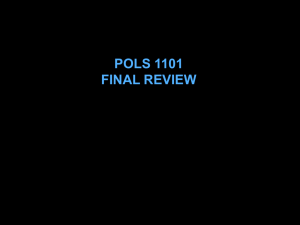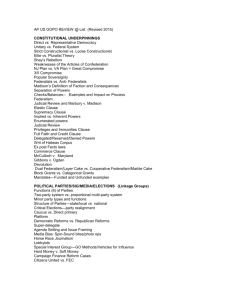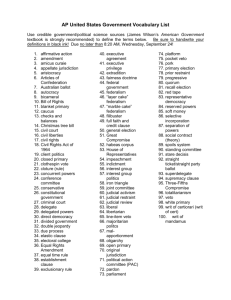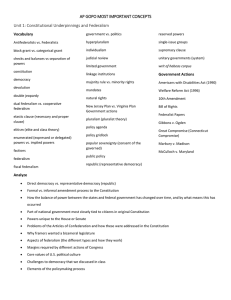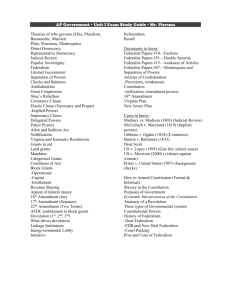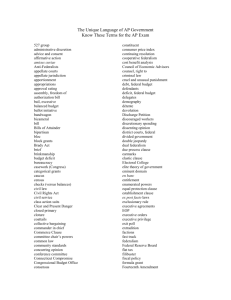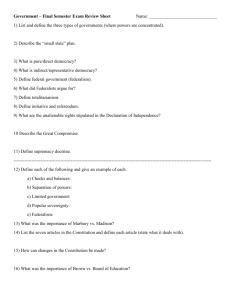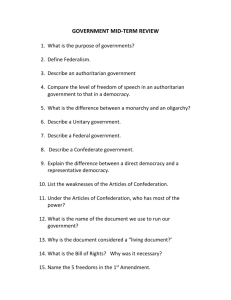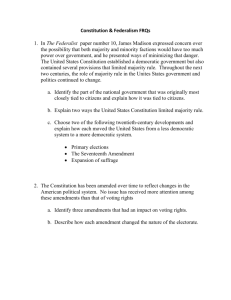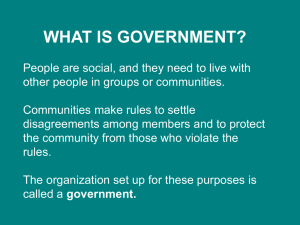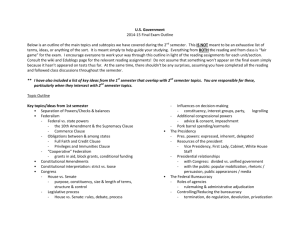AP Gov Nuts and Bolts
advertisement
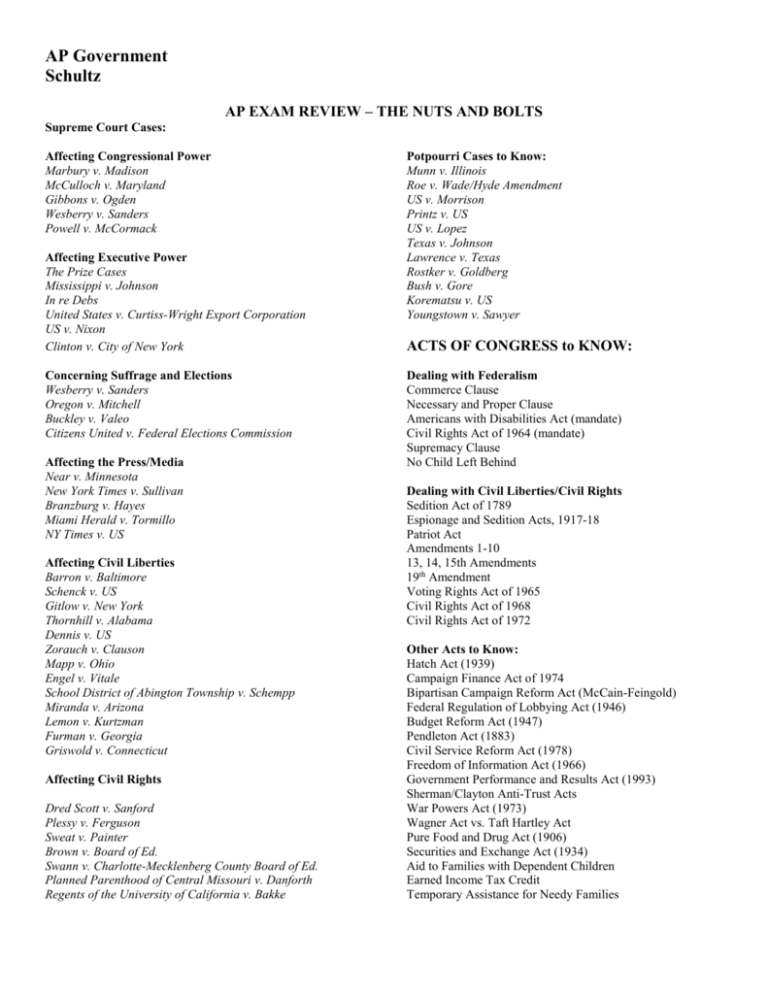
AP Government Schultz AP EXAM REVIEW – THE NUTS AND BOLTS Supreme Court Cases: Affecting Congressional Power Marbury v. Madison McCulloch v. Maryland Gibbons v. Ogden Wesberry v. Sanders Powell v. McCormack Affecting Executive Power The Prize Cases Mississippi v. Johnson In re Debs United States v. Curtiss-Wright Export Corporation US v. Nixon Clinton v. City of New York Concerning Suffrage and Elections Wesberry v. Sanders Oregon v. Mitchell Buckley v. Valeo Citizens United v. Federal Elections Commission Affecting the Press/Media Near v. Minnesota New York Times v. Sullivan Branzburg v. Hayes Miami Herald v. Tormillo NY Times v. US Affecting Civil Liberties Barron v. Baltimore Schenck v. US Gitlow v. New York Thornhill v. Alabama Dennis v. US Zorauch v. Clauson Mapp v. Ohio Engel v. Vitale School District of Abington Township v. Schempp Miranda v. Arizona Lemon v. Kurtzman Furman v. Georgia Griswold v. Connecticut Affecting Civil Rights Dred Scott v. Sanford Plessy v. Ferguson Sweat v. Painter Brown v. Board of Ed. Swann v. Charlotte-Mecklenberg County Board of Ed. Planned Parenthood of Central Missouri v. Danforth Regents of the University of California v. Bakke Potpourri Cases to Know: Munn v. Illinois Roe v. Wade/Hyde Amendment US v. Morrison Printz v. US US v. Lopez Texas v. Johnson Lawrence v. Texas Rostker v. Goldberg Bush v. Gore Korematsu v. US Youngstown v. Sawyer ACTS OF CONGRESS to KNOW: Dealing with Federalism Commerce Clause Necessary and Proper Clause Americans with Disabilities Act (mandate) Civil Rights Act of 1964 (mandate) Supremacy Clause No Child Left Behind Dealing with Civil Liberties/Civil Rights Sedition Act of 1789 Espionage and Sedition Acts, 1917-18 Patriot Act Amendments 1-10 13, 14, 15th Amendments 19th Amendment Voting Rights Act of 1965 Civil Rights Act of 1968 Civil Rights Act of 1972 Other Acts to Know: Hatch Act (1939) Campaign Finance Act of 1974 Bipartisan Campaign Reform Act (McCain-Feingold) Federal Regulation of Lobbying Act (1946) Budget Reform Act (1947) Pendleton Act (1883) Civil Service Reform Act (1978) Freedom of Information Act (1966) Government Performance and Results Act (1993) Sherman/Clayton Anti-Trust Acts War Powers Act (1973) Wagner Act vs. Taft Hartley Act Pure Food and Drug Act (1906) Securities and Exchange Act (1934) Aid to Families with Dependent Children Earned Income Tax Credit Temporary Assistance for Needy Families Vocabulary to know: Authority Bureaucratic view Democracy Direct (participatory) democracy Constitutional Convention Enumerated powers Ex post facto law Bill of Attainder Bill of Rights Checks and balances Coalition Concurrent powers Block grants Conditions of aid Devolution Dual federalism civic competence civic duty class consciousness Clear and present danger test Due process of law Equal protection of the law Establishment clause Exclusionary rule Affirmative action Civil disobedience Civil rights police powers Elite Exit polls Gender gap Norm voting age population registered voters national convention plurality system political machine political party National committee 527 organizations blanket primary caucus (electoral) open primary coattails general election gerrymandering Incentive purposive incentive conservative coalition discharge petition majority leader filibuster ad hoc structure bully pulpit cabinet circular structure divided government appropriation bureaucracy issue network Elite Legitimacy Marxist view Pluralist view Inalienable/ Unalienable Line-item veto New Jersey Plan Faction Federalism Federalists Great Compromise Habeas Corpus Grants-in-aid Initiative Mandates Necessary and proper clause orthodox religion political culture political efficacy freedom of expression freedom of religion free exercise clause First Amendment incorporation equality of opportunity equality of result Jim Crow suspect classification political elites political ideology political socialization poll poll tax Ideological Party split ticket straight ticket superdelegates two-party system solidary incentive incumbent independent expenditures malapportionment soft money political action committee position issue primary election public-interest lobby solidary incentive joint committee joint resolution concurrent resolution cloture Electoral College gridlock impeachment lame duck legislative veto laissez-faire iron triangle activist approach Power elite view Power Representative democracy Amendment Antifederalists Articles of Confederation Great Compromise Republic Reserved Powers Separation of Powers Shays’s Rebellion Virginia Plan Nullification Police power Recall Referendum progressive religion internal efficacy external efficacy libel probable cause search warrant symbolic speech wall of separation reverse discrimination separate but equal De facto segregation De jure segregation public opinion random sample sampling error literacy test Grandfather clause Congressional campaign committee Critical or realignment period Progressives National chairman Winner-take-all proportional representation prospective voting retrospective voting closed primary BCRA sophomore surge valence issue Ideological interest group Material incentive bicameral legislature caucus closed rule conference committee reconciliation line-item veto pocket veto pyramid structure unified government veto message discretionary authority red tape diversity cases per curiam opinion amicus curiae political question concurring opinion constitutional court court of appeals dissenting opinion district courts interest-group politics logrolling entrepreneurial politics fiscal policy deficit Keynesianism supply side economics military-industrial complex isolationism pollution allowances dual sovereignty class action suit informa puaperis judicial review legislative court litmus test opinion of the Court political agenda pork barrel legislation policy entrepreneurs monetary policy gross domestic policy (GDP) entitlement containment human rights bubble standard Environmental Protection Agency brief remedy sovereign immunity standing stare decisis strict constructionist approach writ of certiorari client politics majoritarian politics budget national debt Reaganomics monetarism gold plating disengagement environmental impact statement electioneering FRQ Themes: 2000: US Constitution vs. Articles of Confederation, Supreme Court Powers, Campaign Finance Reform 2001: Informal and Formal changes to US Constitution, 14 th Amendment related to SC Cases 2002: Divided Government and Presidential power, Gov’t Benefits, Political Institutions and Federalism, Voter Turnout 2003: Presidential Approval Ratings, Bureaucracy, Political Participation Other than Voting, Congressional Committees 2004: Presidents and Congress with regards to Foreign Policy, Interest Group Techniques, Minor Parties, Trust and Confidence in Government 2005: Independence of Judicial Branch, Power of Federal Gov’t over Power of States, US Constitution and SC Cases that Protect Rights of Citizens, Congress and Campaign Finance Reform 2006: Goals of Political Parties, Social Security, Congressional and Presidential Power to Enact Federal Law, Bicameral System in US Constitution 2007: Electoral College and Winner-Take-All System, First Amendment Rights tied to SC Cases, Conflicts between Congress and US Presidents regarding War Powers, Federalism with Grants, Mandates, etc. 2008: Congressional Reapportionment and Redistricting, Congress and Presidential Power with regards to Domestic Policy, Fiscal and Monetary Policy, 15th Amendment and Federalism 2009: Federalist #10 and Majority Rule, Voting Trends (Age, Education), House of Representative vs. Senate with regards to Majority Party and Rules, Changing Influence of Media over time and across Ages

